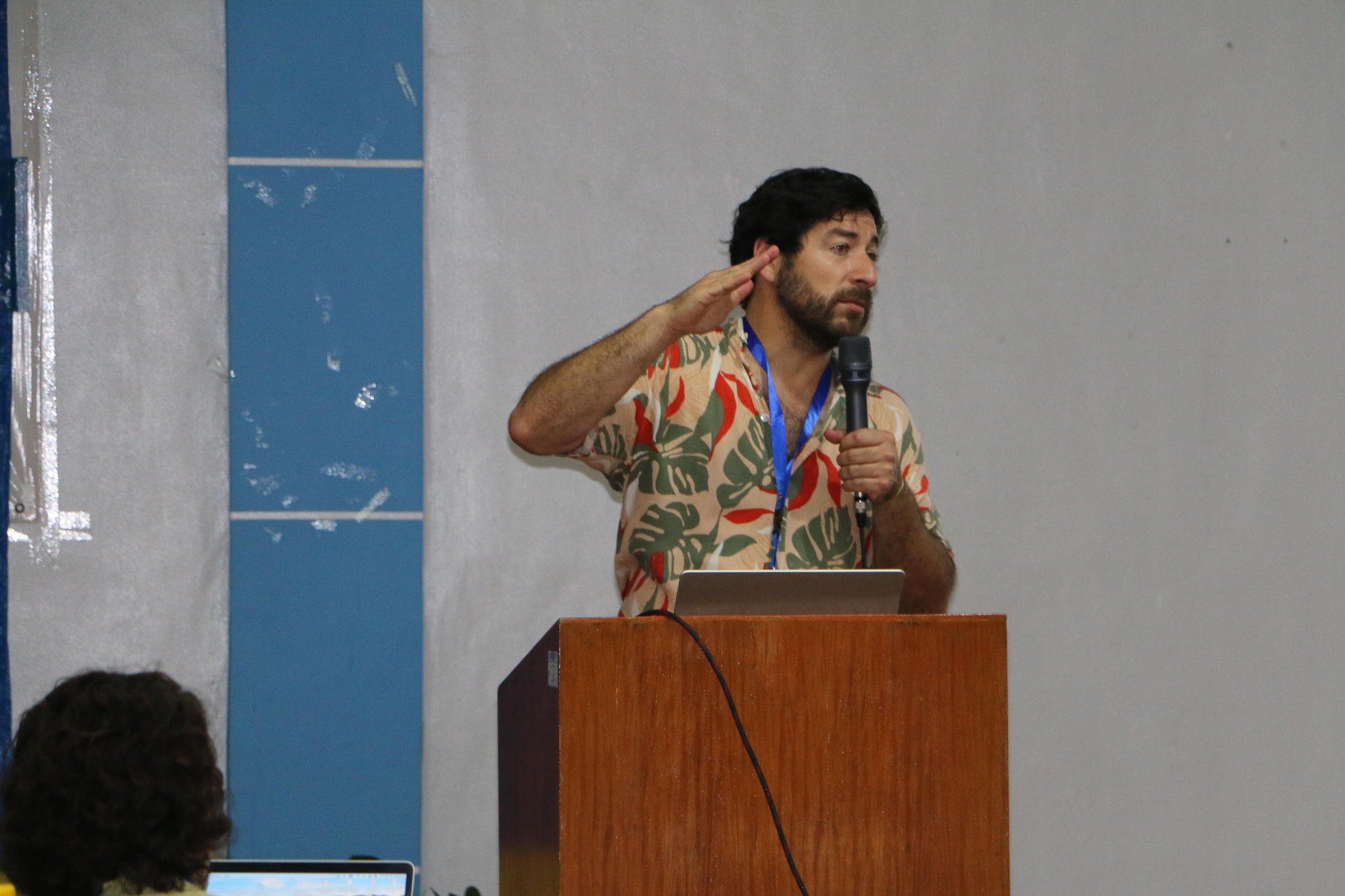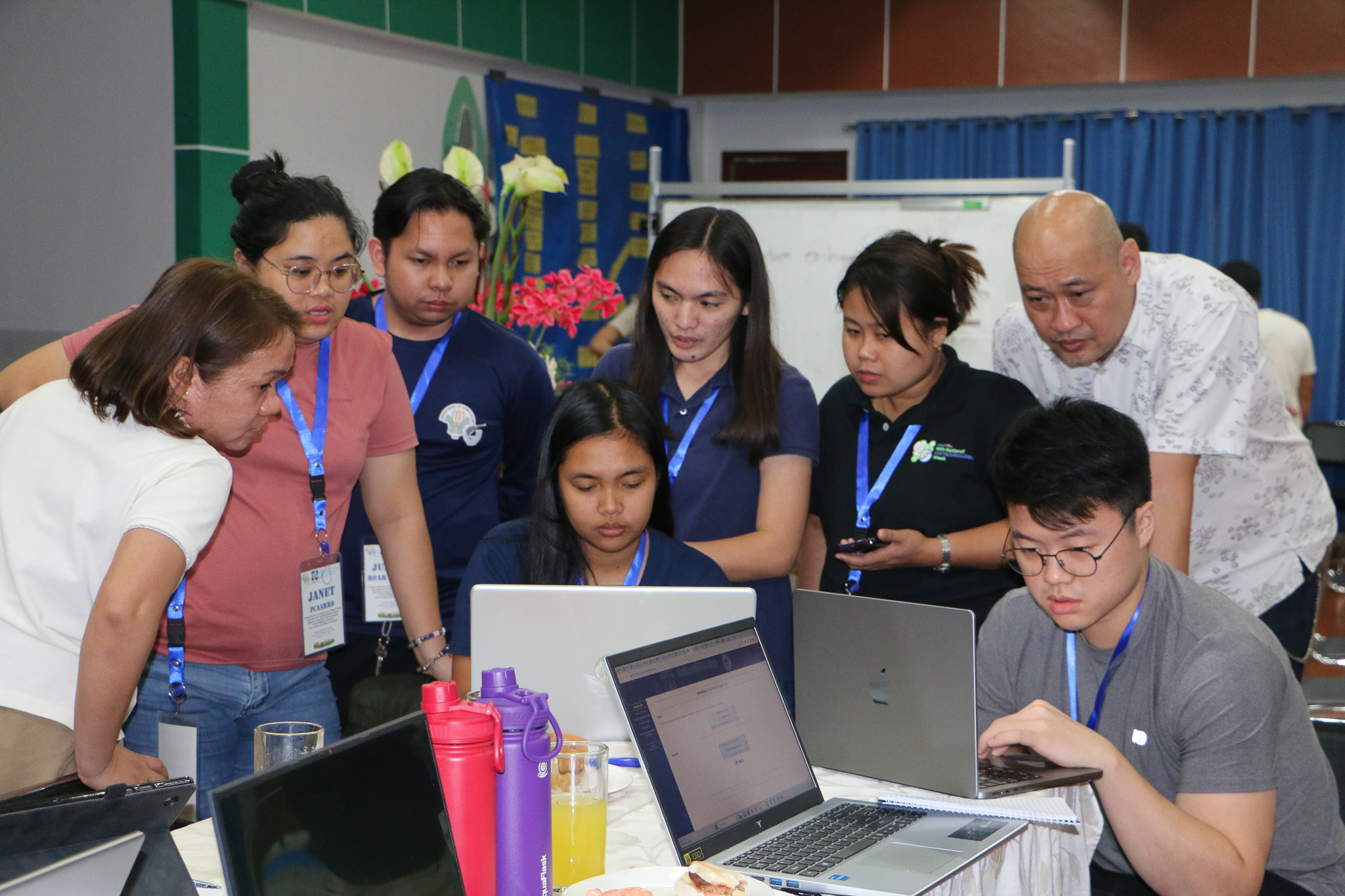State universities and colleges and public and private organizations leading the aquatic sector around the country underwent a seven-day in-depth training course on implementing the Food and Agriculture Organization’s (FAO) 12-point Checklist for Surveillance of Diseases of Aquatic Organisms, held in Muñoz, Nueva Ecija from September 11-16, 2023.
The week-long training was made possible through the strong collaboration of the Inland Aquatic Resources Research Division (IARRD) of the Philippine Council for Agriculture, Aquatic and Natural Resources Research and Development of the Department of Science and Technology (DOST-PCAARRD), Bureau of Fisheries and Aquatic Resources-National Freshwater Laboratory Division (BFAR-NFLD), and Food and Agriculture Organization of the United Nations (FAO).

Dr. Fernando Mardones delivering a lecture on Checklist 9: data analysis during the training program in Muñoz, Nueva Ecija.
Participants were equipped with knowledge and strategies to protect cultured aquatic species.
Lectures and working group exercises were led by an international team of FAO experts: Dr. Melba B. Reantaso, Dr. Fernando Mardones, Dr. Bei Bei Jia, and Dr. Kathy Tang-Nelson. Topics were further expanded and elaborated in the Philippine setting through the help of local aquaculture experts: Dr. Joselito Somga, Chief of BFAR-Fisheries Inspection and Quarantine Division; Dr. Sonia Somga, Chief of BFAR-National Fisheries Laboratory Division; Dr. Celia Lavilla-Pitogo, Feedmix Specialist Inc. II Consultant; and Dr. Jose O. Paclibare, private consultant.
During the opening program, Dr. Adelaida Calpe, IARRD Director, represented DOST-PCAARRD on behalf of Dr. Reynaldo Ebora, the Council’s Executive Director. Dr. Ebora’s message capitalized on the strong collaboration among agencies, whether public or private, to “employ innovative and sustainable approaches to ensure the health and well-being of the aquatic ecosystems."
“By capitalizing on this upscaling and capacitating programs, we are also advancing our efforts in fostering a fisheries sector that is centered with scientific solutions and approaches, mitigating impact of aquatic organism diseases, and safeguarding both the livelihood of our fellow Filipinos and the nation’s food security,” he added.
The training was initiated to capacitate the participants in disease surveillance and monitoring activities. Through the careful guidance of the experts, the training focused on each of the 12-point active surveillance checklist: 1) scenario setting; (2) defining the surveillance objectives; (3) defining the population; (4) clustering of diseases; (5) case definition; (6) diagnostic testing; (7) study design and sampling; (8) data collection and management; (9) data analysis; (10) validation and assurance; (11) human and financial resources and logistics requirements; and (12) surveillance in the bigger picture.

Participants of the training program working on their assigned group exercises
FAO representative to the Philippines, Dr. Lionel Henri Valentin Dabbadie also visited on second day of the training course. He encouraged the participants to continue what they have started and enrich what they have learned.
Participants were divided into four working groups using scenarios of aquatic organisms diseases in the country: (1) Acute Hepatopancreatic Necrosis Disease (bacteria/shrimp); (2) Enterocytozoon hepatopenaei (parasite/shrimp); (3) Streptococcus agalactiae; and (4) Megalocytivirus (virus/milkfish). At the end of the training, they have successfully crafted, designed, and presented their respective work plan and line-item budget on each of their disease surveillance initiatives.
To immerse the participants in an aquaculture setting, they have also visited the PHILNOR Aqua Hatchery in Quezon, Nueva Ecija.
Dr. Melvin Carlos, Deputy Executive Director for Administration, Resource Management and Support Services of the DOST-PCAARRD further elaborated the essence of the training during the closing program, “Training programs like these offer a great opportunity for everyone, especially for the key actors in our fisheries and aquatic sector to explore ways of maximizing our efforts towards establishing a healthy and robust aquatic ecosystem,” he highlighted.
Fisheries play a crucial role in ensuring the nation's food security and driving economic growth. Beyond just nourishment, they offer livelihoods that sustain many of the Philippine communities. DOST-PCAARRD remains committed to supporting and strengthening the fisheries and aquatic sector through various research and development initiatives. Its utmost priority always goes back to the impact and benefits of its efforts to the stakeholders while pushing forward and reinforcing the country’s scientific and technological landscape.
Training programs such as this paves a way in empowering and equipping the sector with knowledge and skills to maintain and protect the country’s aquatic species. Participants are expected to employ the 12-point surveillance checklist in the country’s aquaculture scenario.

